Automated macOS installation for VMs
by Jakub Jirůtka

Source: https://www.deviantart.com/kossnocorp/art/Hackintosh-logo-130022106
InstallFest 2024
“Holistic software engineer”
Works at FEE CTU in Prague
FOSS developer & contributor
Alpine Linux developer
$~ whoami


@jirutka
@jakub@jirutka.cz
@JakubJirutka


Source: https://lezebre.lu/en/sticker-simons-cat-claws/
This presentation is for educational purposes only. Techniques shown may not comply with Apple’s License Agreement. Use at your own risk. No liability assumed.
Disclaimer
preconfigured VM images for CI and also for developers
deterministic and fully documented environment
periodic and fully automatic regeneration
supporting multiple versions

Why?
Source: ChatGPT 4 (DALL-E 2)
building and testing applications for macOS (on CI)

But why macOS?
Source: ChatGPT 4 (DALL-E 2)
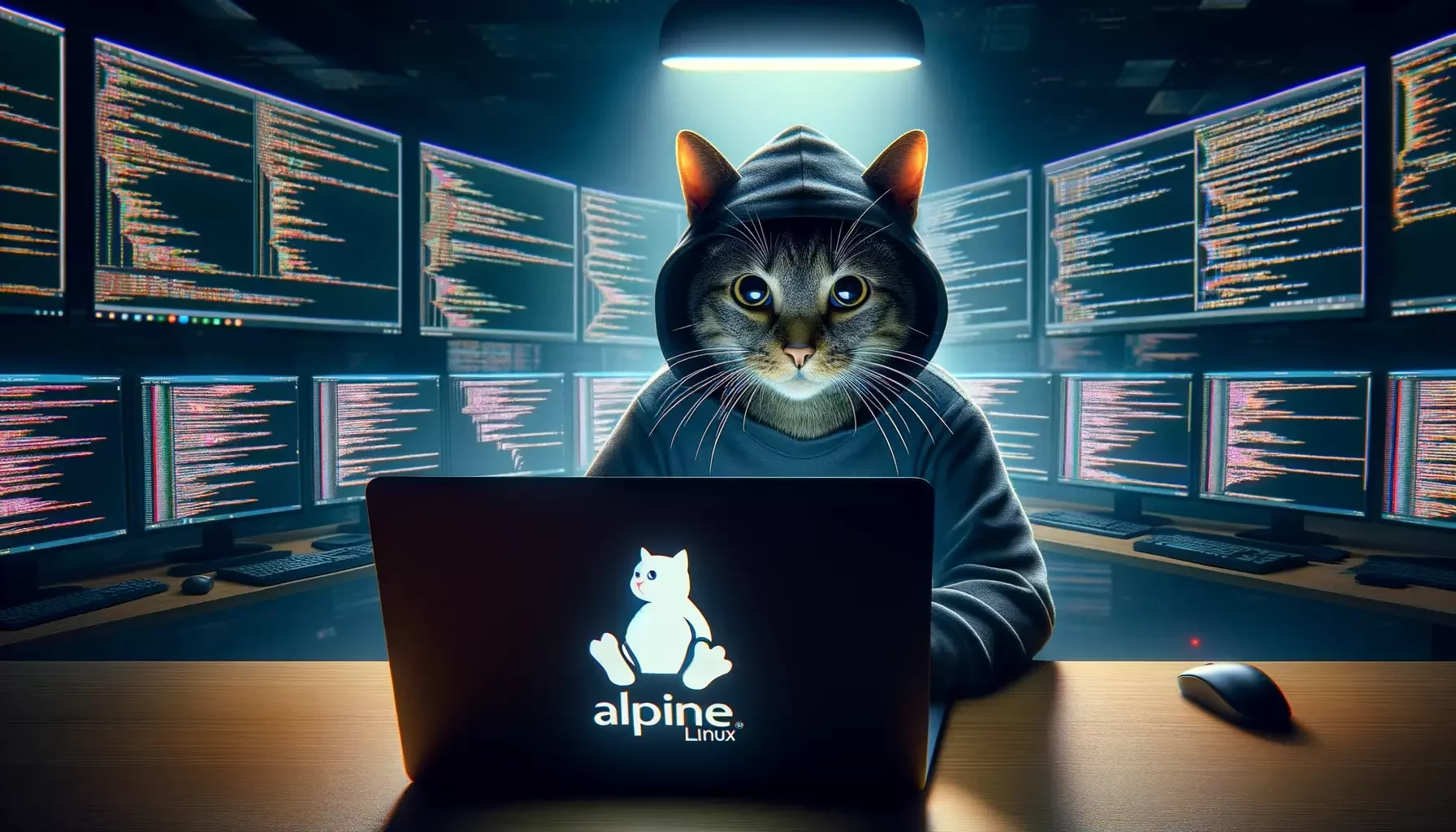
Source: ChatGPT 4 (DALL-E 2) trained on art stolen from the Internet
How does this work with Linux?
https://github.com/alpinelinux/alpine-make-vm-image
alpine-make-vm-image
Script to create custom Alpine Linux disk images for x86_64 and aarch64 virtual machines.
~400 LoC in POSIX shell
Uses just apk-tools, qemu-img, qemu-nbd, chroot, runs on any Linux.
> apk not found, downloading static apk-tools
URL:https://gitlab.alpinelinux.org/api/v4/projects/5/packages/generic/v2.14.0/x86_64/apk.static [4336800/4336800] -> "apk.static" [1]
apk.static: OK
> Creating qcow2 image of size 2G
Formatting 'alpine-bios-2024-01-06.qcow2', fmt=qcow2 cluster_size=65536 extended_l2=off compression_type=zlib size=2147483648 lazy_refcounts=off refcount_bits=16
> Attaching image alpine-bios-2024-01-06.qcow2 as a NBD device
> Creating filesystem(s)
mke2fs 1.46.5 (30-Dec-2021)
64-bit filesystem support is not enabled. The larger fields afforded by this feature enable full-strength checksumming. Pass -O 64bit to rectify.
Creating filesystem with 524288 4k blocks and 131072 inodes
Filesystem UUID: 35cd1afa-4e8f-4331-aebc-bf6f72fa3661
Superblock backups stored on blocks:
32768, 98304, 163840, 229376, 294912
Allocating group tables: 0/16 done
Writing inode tables: 0/16 done
Creating journal (16384 blocks): done
Writing superblocks and filesystem accounting information: 0/16 done
> Mounting image at /tmp/alpine-make-vm-image.5zC7DM
> Installing base system
# ./apk.static add --root $rootdir --initdb --arch x86_64 alpine-base
fetch http://dl-cdn.alpinelinux.org/alpine/edge/main/x86_64/APKINDEX.tar.gz
fetch http://dl-cdn.alpinelinux.org/alpine/latest-stable/main/x86_64/APKINDEX.tar.gz
fetch http://dl-cdn.alpinelinux.org/alpine/latest-stable/community/x86_64/APKINDEX.tar.gz
(1/25) Installing alpine-baselayout-data (3.4.3-r2)
(2/25) Installing musl (1.2.4_git20230717-r4)
(3/25) Installing busybox (1.36.1-r15)
Executing busybox-1.36.1-r15.post-install
(4/25) Installing busybox-binsh (1.36.1-r15)
(5/25) Installing alpine-baselayout (3.4.3-r2)
Executing alpine-baselayout-3.4.3-r2.pre-install
Executing alpine-baselayout-3.4.3-r2.post-install
(6/25) Installing ifupdown-ng (0.12.1-r4)
(7/25) Installing libcap2 (2.69-r1)
(8/25) Installing openrc (0.52.1-r1)
Executing openrc-0.52.1-r1.post-install
(9/25) Installing mdev-conf (4.6-r0)
(10/25) Installing busybox-mdev-openrc (1.36.1-r15)
(11/25) Installing alpine-conf (3.17.0-r0)
(12/25) Installing alpine-keys (2.4-r1)
(13/25) Installing alpine-release (3.19.0-r0)
(14/25) Installing ca-certificates-bundle (20230506-r0)
(15/25) Installing libcrypto3 (3.1.4-r2)
(16/25) Installing libssl3 (3.1.4-r2)
(17/25) Installing ssl_client (1.36.1-r15)
(18/25) Installing zlib (1.3-r2)
(19/25) Installing apk-tools (2.14.0-r5)
(20/25) Installing busybox-openrc (1.36.1-r15)
(21/25) Installing busybox-suid (1.36.1-r15)
(22/25) Installing scanelf (1.3.7-r2)
(23/25) Installing musl-utils (1.2.4_git20230717-r4)
(24/25) Installing libc-utils (0.7.2-r5)
(25/25) Installing alpine-base (3.19.0-r0)
Executing busybox-1.36.1-r15.trigger
OK: 10 MiB in 25 packages
(1/5) Installing libblkid (2.39.3-r0)
(2/5) Installing libcom_err (1.47.0-r5)
(3/5) Installing e2fsprogs-libs (1.47.0-r5)
(4/5) Installing libuuid (2.39.3-r0)
(5/5) Installing e2fsprogs (1.47.0-r5)
Executing busybox-1.36.1-r15.trigger
OK: 11 MiB in 30 packages
> Installing kernel linux-virt
(1/12) Installing xz-libs (5.4.5-r0)
(2/12) Installing zstd-libs (1.5.5-r8)
(3/12) Installing kmod (31-r2)
(4/12) Installing kmod-openrc (31-r2)
(5/12) Installing lddtree (1.27-r0)
(6/12) Installing argon2-libs (20190702-r5)
(7/12) Installing device-mapper-libs (2.03.23-r0)
(8/12) Installing json-c (0.17-r0)
(9/12) Installing cryptsetup-libs (2.6.1-r8)
(10/12) Installing kmod-libs (31-r2)
(11/12) Installing mkinitfs (3.9.0-r0)
Executing mkinitfs-3.9.0-r0.post-install
(12/12) Installing linux-virt (6.6.9-r0)
Executing busybox-1.36.1-r15.trigger
Executing kmod-31-r2.trigger
Executing mkinitfs-3.9.0-r0.trigger
==> initramfs: creating /boot/initramfs-virt for 6.6.9-0-virt
OK: 58 MiB in 42 packages
> Installing and configuring mkinitfs
> Setting up extlinux bootloader
(1/3) Installing mtools (4.0.43-r1)
(2/3) Installing blkid (2.39.3-r0)
(3/3) Installing syslinux (6.04_pre1-r15)
OK: 62 MiB in 45 packages
/boot is device /dev/nbd15
Warning: unable to obtain device geometry (defaulting to 64 heads, 32 sectors)
(on hard disks, this is usually harmless.)
/boot is device /dev/nbd15
Warning: unable to obtain device geometry (defaulting to 64 heads, 32 sectors)
(on hard disks, this is usually harmless.)
> Configuring system
> Enabling base system services
* service devfs added to runlevel sysinit
* service dmesg added to runlevel sysinit
* service mdev added to runlevel sysinit
* service hwdrivers added to runlevel sysinit
* service cgroups added to runlevel sysinit
* service modules added to runlevel boot
* service hwclock added to runlevel boot
* service swap added to runlevel boot
* service hostname added to runlevel boot
* service sysctl added to runlevel boot
* service bootmisc added to runlevel boot
* service syslog added to runlevel boot
* service seedrng added to runlevel boot
* service killprocs added to runlevel shutdown
* service savecache added to runlevel shutdown
* service mount-ro added to runlevel shutdown
> Installing additional packages
(1/30) Installing gmp (6.3.0-r0)
(2/30) Installing nettle (3.9.1-r0)
(3/30) Installing libunistring (1.1-r2)
(4/30) Installing libidn2 (2.3.4-r4)
(5/30) Installing libffi (3.4.4-r3)
(6/30) Installing libtasn1 (4.19.0-r2)
(7/30) Installing p11-kit (0.25.3-r0)
(8/30) Installing gnutls (3.8.1-r0)
(9/30) Installing libseccomp (2.5.5-r0)
(10/30) Installing chrony (4.5-r0)
Executing chrony-4.5-r0.pre-install
(11/30) Installing chrony-openrc (4.5-r0)
(12/30) Installing doas (6.8.2-r6)
(13/30) Installing doas-sudo-shim (0.1.1-r1)
(14/30) Installing ncurses-terminfo-base (6.4_p20231125-r0)
(15/30) Installing libncursesw (6.4_p20231125-r0)
(16/30) Installing less (643-r1)
(17/30) Installing libacl (2.3.1-r4)
(18/30) Installing popt (1.19-r3)
(19/30) Installing logrotate (3.21.0-r1)
(20/30) Installing logrotate-openrc (3.21.0-r1)
(21/30) Installing openssh-keygen (9.6_p1-r0)
(22/30) Installing libedit (20230828.3.1-r3)
(23/30) Installing openssh-client-common (9.6_p1-r0)
(24/30) Installing openssh-client-default (9.6_p1-r0)
(25/30) Installing openssh-sftp-server (9.6_p1-r0)
(26/30) Installing openssh-server-common (9.6_p1-r0)
(27/30) Installing openssh-server-common-openrc (9.6_p1-r0)
(28/30) Installing openssh-server (9.6_p1-r0)
(29/30) Installing openssh (9.6_p1-r0)
(30/30) Installing ssmtp (2.64-r20)
Executing busybox-1.36.1-r15.trigger
OK: 76 MiB in 75 packages
> Copying content of /home/runner/work/alpine-make-vm-image/alpine-make-vm-image/example/rootfs into image
./
usr/
usr/local/
usr/local/bin/
usr/local/bin/hello
> Executing script in chroot: configure.sh
Linux fv-az520-878 6.2.0-1018-azure #18~22.04.1-Ubuntu SMP Tue Nov 21 19:25:02 UTC 2023 x86_64 Linux
1) Set up timezone
2) Set up networking
3) Adjust rc.conf
4) Enable services
* service acpid added to runlevel default
* service chronyd added to runlevel default
* service crond added to runlevel default
* service net.eth0 added to runlevel default
* service net.lo added to runlevel boot
* service termencoding added to runlevel boot
5) List /usr/local/bin
total 12
drwxr-xr-x 2 root root 4096 Jan 6 19:08 .
drwxr-xr-x 5 root root 4096 Jan 6 19:08 ..
-rwxr-xr-x 1 root root 32 Jan 6 19:08 hello
> Completed
-rw-r--r-- 1 root root 174M Jan 6 18:08 alpine-bios-2024-01-06.qcow2
/dev/nbd15 disconnected


11seconds
From 0 to customised bootable VM image with
in

So how about macOS…?
Source: ChatGPT 4 (DALL-E 2) trained on art stolen from the Internet
It’s a UNIX system…
Source: https://www.youtube.com/watch?v=JOeY07qKU9c

…or is it?
Source: ChatGPT 4 (DALL-E 2) trained on art stolen from the Internet
BSD
Source: https://en.wikipedia.org/wiki/Architecture_of_macOS
macOS architecture
XNU
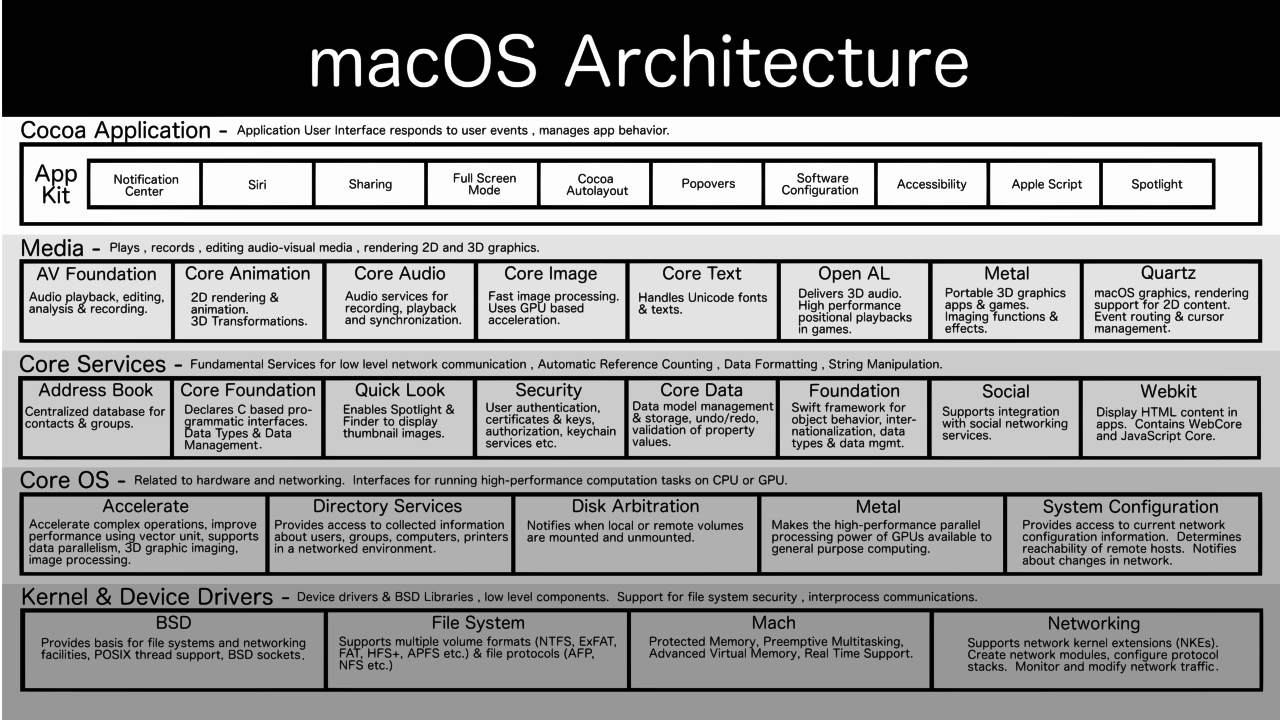
- QEMU ≥ 6.2.0
- CPU with Intel VT-x / AMD SVM, SSE4.1 and AVX2
-
OpenCore – bootloader (successor of Clover)
- https://github.com/kholia/OSX-KVM
Problems:
- virtio-blk is supported, but virtio-scsi is not
- macOS is sensitive to TSC (must be monotonic)
- running macOS on QEMU on QEMU doesn’t work
What’s needed to boot macOS on QEMU/KVM?
QEMU parameters
qemu-system-x86_64 \
-enable-kvm -machine q35 -m 4096 -smp 4,cores=2,sockets=1 \
-cpu Skylake-Server,kvm=on,vendor=GenuineIntel,vmware-cpuid-freq=on,\
+invtsc,+ssse3,+sse4.2,+popcnt,+avx,+aes,+xsave,+xsaveopt,check \
-device isa-applesmc,\
osk="ourhardworkbythesewordsguardedpleasedontsteal(c)AppleComputerInc" \
-usb -device usb-kbd -device usb-tablet \
-device usb-ehci,id=ehci \
-device nec-usb-xhci,id=xhci \
-global nec-usb-xhci.msi=off \
-drive if=pflash,format=raw,readonly=on,file=OVMF_CODE.fd \
-drive if=pflash,format=raw,file=OVMF_VARS.fd \
-smbios type=2 \
-device ich9-ahci,id=sata \
-drive id=OpenCoreBoot,if=none,snapshot=on,format=qcow2,file=OpenCore.qcow2 \
-device ide-hd,bus=sata.2,drive=OpenCoreBoot \
-drive id=InstallMedia,if=none,file=BaseSystem.img,format=raw \
-device ide-hd,bus=sata.3,drive=InstallMedia \
-drive id=MacHDD,if=none,file=MacHDD.qcow2,format=qcow2 \
-device ide-hd,bus=sata.4,drive=MacHDD \
-netdev user,id=net0,hostfwd=tcp::2222-:22 -device virtio-net-pci,netdev=net0,\
id=net0,mac=52:54:00:c9:18:27 \
-monitor stdio \
-device vmware-svgahttps://github.com/kholia/OSX-KVM/
our hard work by these words guarded please dont steal
(c)AppleComputerInc

Source: ChatGPT 4 (DALL-E 2)
CI infrastructure
IaaS

GitLab

Runner Manager
API
KVM
Hardware
Host Linux Kernel

Guest OS
QEMU
libvirtd

Guest OS
QEMU
Guest OS
QEMU


CI Pipeline
installer-image-fetch
opencore-image-fetch
check-images
setup
customize
finalize
install
CI Pipeline
installer-image-fetch
opencore-image-fetch
check-images
setup
customize
finalize
install
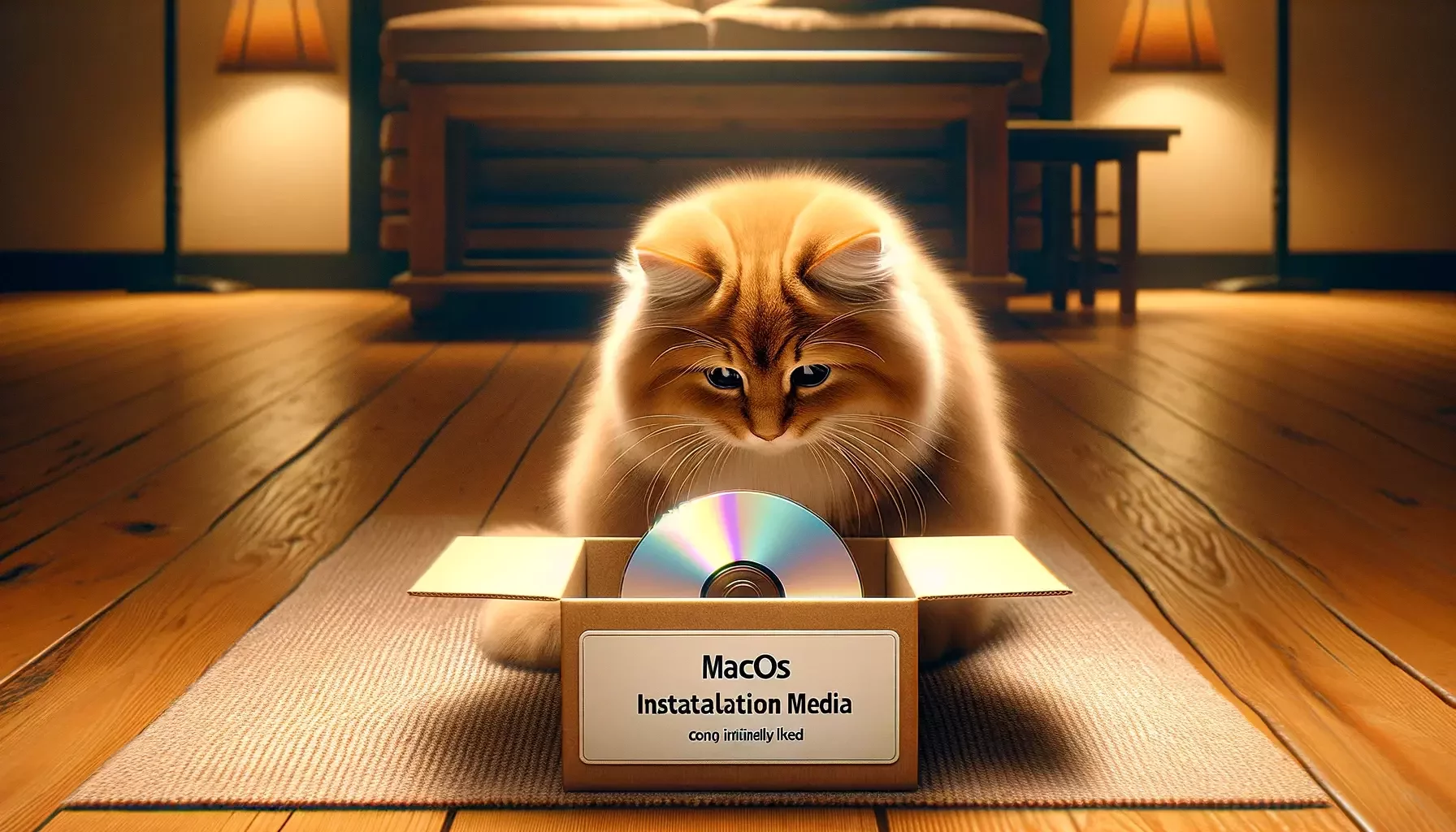
Where/how to get macOS installation?
Source: ChatGPT 4 (DALL-E 2) trained on art stolen from the Internet
Hidden partition in every Apple device running macOS.
Downloads installation data from osrecovery.apple.com.
macOS Internet Recovery
BaseSystem.dmg – bootable image
macOS Internet Recovery
-bash-3.2# ./startosinstall ...
Preparing: 100%
Restarting...
Error: system reboot failed
Source: https://archive.org/details/cat-meme/03c9ee9c0a5f15908ea183bf0b4bea98.png
macOS Internet Recovery
osinstallersetupd[535]: OSISPredicateUpdateProduct: OS Installation Payload:
Multiple matching products found; choosing the one with the latest post date
osinstallersetupd[535]: OSISPredicateUpdateProduct: <IAMSUProduct: key=042-95491,
name="macOS Ventura", evaluated=YES, installable=YES, staged=NO>: Found product: OS Installation Payload
...
osinstallersetupd[535]: IA OS Version: 13.6.2
osinstallersetupd[535]: IA OS Build: 22G2321
...
osishelperd_intel[537]: -[OSISHelper blessUpdateBundleAtPath:mutableProductPath:enclosingMountPoint:withReply:]
failed to copy /Volumes/System/macOS Install Data/UpdateBundle/AssetData/
./boot/Firmware/System/Library/CoreServices/bootbase.efi
osinstallersetupd[535]: -[OSISHelperProxy blessUpdateBundleAtPath:mutableProductPath:enclosingMountPoint:]_block_invoke_2: Error Domain=NSCocoaErrorDomain Code=260
"The file “bootbase.efi” couldn’t be opened because there is no such file." UserInfo={NSFilePath=/Volumes/System/macOS Install Data/UpdateBundle/AssetData/./boot/Firmware/System/Library/CoreServices/bootbase.efi, NSUnderlyingError=0x6000017753b0 {Error Domain=NSPOSIXErrorDomain Code=2 "No such file or directory"}}macOS Internet Recovery
The build 22G2321 is for the MacBook Pro with M3 that shipped with macOS Ventura.
The problem right now is that the installer is listing the available Monterey versions, and picking the newest compatible one. The newest one is currently the M2-only update, which is causing the issue, but it shouldn’t be picking this as it is incompatible.
Source: https://www.reddit.com/r/homelab/comments/qg37an/comment/idx3eyk/
But this topic is not about Hackintosh, this is happening on genuine MacBook!
Download full (offline) macOS installation
Script gibMacOS.py from github.com/corpnewt/gibMacOS.
./gibMacOS.py --print-json --device-id VMM-x86_64 --version 14.1 --no-interactive
./gibMacOS.py --version 14.1 --build 23B74 --no-interactiveInstallAssistant.pkg – macOS package
Can be downloaded from AppStore – requires login.
InstallAssistant.pkg
$ du InstallAssistant.pkg
12.7G InstallAssistant.pkg
$ file InstallAssistant.pkg
InstallAssistant.pkg: xar archive compressed TOC: 4313, SHA-1 checksum
$ 7z x -t xar InstallAssistant.pkg
$ ls
-rw-r--r-- 269.3K Bom
-rw-r--r-- 918 PackageInfo
-rw-r--r-- 11.1M Payload
-rw-r--r-- 643 Scripts
-rw-r--r-- 12.7G SharedSupport.dmg
-rw-r--r-- 8.9K [TOC].xml
$ file SharedSupport.dmg git
SharedSupport.dmg: DOS/MBR boot sector, code offset 0x58+2, OEM-ID "BSD 4.4", sectors/track 32, heads 16, sectors 409600 (volumes > 32 MB), FAT (32 bit), sectors/FAT 3151, serial number 0x67e317ed, label: "EFI "
$ dmg2img -l SharedSupport.dmg
SharedSupport.dmg --> (partition list)
partition 0: Protective Master Boot Record (MBR : 0)
partition 1: GPT Header (Primary GPT Header : 1)
partition 2: GPT Partition Data (Primary GPT Table : 2)
partition 3: (Apple_Free : 3)
partition 4: EFI System Partition (C12A7328-F81F-11D2-BA4B-00A0C93EC93B : 4)
partition 5: disk image (Apple_HFS : 5)
partition 6: (Apple_Free : 6)
partition 7: GPT Partition Data (Backup GPT Table : 7)
partition 8: GPT Header (Backup GPT Header : 8)
$ 7z x SharedSupport.dmg
7-Zip (z) 23.01 (x64) : Copyright (c) 1999-2023 Igor Pavlov : 2023-06-20
64-bit locale=C.UTF-8 Threads:12 OPEN_MAX:1024
Scanning the drive for archives:
1 file, 13605194978 bytes (13 GiB)
Extracting archive: SharedSupport.dmg
--
Path = SharedSupport.dmg
Type = Dmg
Physical Size = 13605194978
Method = Zero0 Copy Zero2 CRC
Blocks = 98
----
Path = 5.hfs
Size = 14005383168
Packed Size = 13605063168
Comment = disk image (Apple_HFS : 5)
Method = Zero0 Copy Zero2 CRC
--
Path = 5.hfs
Type = HFS
Physical Size = 14005383168
Method = HFS+
Cluster Size = 4096
Free Space = 365486080
Created = 2024-02-28 22:59:11
Modified = 2024-02-29 08:03:59
Everything is Ok
Folders: 5
Files: 83
Size: 13610941804
Compressed: 13605194978
$ cd Shared\ Support
$ tree -h
[ 376] .
├── [ 181] InstallInfo.plist
├── [ 0] [HFS+ Private Data]
├── [6.8K] com_apple_MobileAsset_MacSoftwareUpdate
│ ├── [ 18K] 0de8db5c435029ba8569f7600d6545fdaaf1f010.json
│ ├── [ 18K] 0e897fa22b5abfee6159343e3d1df6671b77f6a9.json
│ ├── ...
│ ├── [ 13G] a8d9e8271da55b7529281b7aadbaf9796b375556.zip
│ ├── [1.0M] com_apple_MobileAsset_MacSoftwareUpdate.xml
│ └── ...
└── [ 300] com_apple_MobileAsset_MobileSoftwareUpdate_MacUpdateBrain
├── [ 12K] 433ad65ffe546a9a89571bda141e7978838eac8a.json
├── [3.7M] 433ad65ffe546a9a89571bda141e7978838eac8a.zip
└── [1.2K] com_apple_MobileAsset_MobileSoftwareUpdate_MacUpdateBrain.xml
4 directories, 81 files
$ file a8d9e8271da55b7529281b7aadbaf9796b375556.zip
a8d9...56.zip: Zip archive data, at least v2.0 to extract, compression method=store
$ 7z x a8d9e8271da55b7529281b7aadbaf9796b375556.zip
$ tree -h --du
[ 13G] .
├── [ 13G] AssetData
│ ├── [2.1K] Info.plist
│ ├── [7.9M] Restore
│ │ ├── [7.5K] 022-15129-328.chunklist
│ │ ├── [ 328] AppleDiagnostics.chunklist
│ │ ├── [2.7M] AppleDiagnostics.dmg
│ │ ├── [4.4K] BaseSystem.chunklist
│ │ └── [5.1M] BootabilityBundle
│ │ └── ...
│ ├── [1.2G] boot
│ │ ├── [ 32] BridgeVersion.bin
│ │ ├── [ 522] BridgeVersion.plist
│ │ ├── [9.6M] BuildManifest.plist
│ │ ├── [ 76M] EFI
│ │ │ ├── [ 11M] AMDFirmware
│ │ │ │ ├── [157K] GpuUtil.efi
│ │ │ │ └── [ 11M] Payloads
│ │ │ │ ├── [256K] D05001A1XG.011
│ │ │ │ ├── ...
│ │ │ │ └── [512K] V20DonguilA1XTEG2_047_186_M465.sb
│ │ │ ├── [265K] AppleSDFirmware
│ │ │ │ ├── [112K] 7A09.ROM
│ │ │ │ ├── [148K] SDFWUpdater.efi
│ │ │ │ ├── [1.2K] UniversalSDFWUpdater.plist
│ │ │ │ └── [3.9K] config.ini
│ │ │ ├── ...
│ │ │ ├── [3.7K] SMCJSONs
│ │ │ │ ├── ...
│ │ │ │ └── [ 62] Mac-FFE5EF870D7BA81A.json
│ │ │ ├── [ 18M] SMCPayloads
│ │ │ │ ├── ...
│ │ │ │ ├── [519K] Mac-FFE5EF870D7BA81A
│ │ │ │ │ ├── [ 31K] Mac-FFE5EF870D7BA81A.epm
│ │ │ │ │ ├── [357K] Mac-FFE5EF870D7BA81A.smc
│ │ │ │ │ ├── [ 93K] flasher_base.smc
│ │ │ │ │ └── [ 38K] flasher_update.smc
│ │ │ │ └── [185K] SmcFlasher.efi
│ │ │ └── [ 25M] USBCUpdater
│ │ │ ├── [ 87K] HPMUtil.efi
│ │ │ ├── ...
│ │ │ ├── [504K] Mac-EE2EBD4B90B839A8
│ │ │ │ ├── [ 702] Config.plist
│ │ │ │ └── [503K] Mac-EE2EBD4B90B839A8-5.92.0.bin
│ │ │ └── [218K] ThorUtil.efi
│ │ ├── [920M] Firmware
│ │ │ ├── ...
│ │ │ ├── [ 56M] 096-17380-285.dmg.x86.mtree
│ │ │ ├── [ 229] 096-17380-285.dmg.x86.root_hash
│ │ │ ├── [336K] 096-17380-285.dmg.x86.trustcache
│ │ │ ├── [157K] AMDFirmware
│ │ │ │ └── [157K] GpuUtil.efi
│ │ │ ├── [ 11M] AOP
│ │ │ │ ├── ...
│ │ │ │ └── [1.9M] aopfw-mac15saop.im4p
│ │ │ │ ...
│ │ │ └── [ 15K] x86_64SURamDisk.dmg.x86.trustcache
│ │ ├── [1.6K] PlatformSupport.plist
│ │ ├── [ 21K] Restore.plist
│ │ ├── [ 360] RestoreVersion.plist
│ │ ├── [ 60M] System
│ │ │ └── [ 60M] Library
│ │ │ └── [ 60M] KernelCollections
│ │ │ └── [ 60M] BootKernelExtensions.kc
│ │ ├── [ 600] SystemVersion.plist
│ │ ├── [ 26M] kernelcache.release.mac13g
│ │ ├── ...
│ │ ├── [ 18M] kernelcache.release.vma2
│ │ └── [ 14K] usr
│ │ └── [ 14K] standalone
│ │ └── [ 14K] bootcaches.plist
│ ├── [ 14] payload
│ │ └── [ 0] replace
│ ├── [437K] payload.bom
│ ├── [ 128] payload.bom.signature
│ ├── [ 12G] payloadv2
│ │ ├── [1.2G] basesystem_patches
│ │ │ ├── [537M] arm64eBaseSystem.dmg
│ │ │ ├── [4.2M] arm64eBaseSystem.dmg.ecc
│ │ │ ├── [674M] x86_64BaseSystem.dmg
│ │ │ └── [2.4M] x86_64BaseSystem.dmg.ecc
│ │ ├── [ 12] data_payload
│ │ ├── [1.9K] firmlinks_payload
│ │ ├── [2.7M] fixup.manifest
│ │ ├── [4.1G] image_patches
│ │ │ ├── [9.0M] cryptex-app
│ │ │ ├── [3.0G] cryptex-system-arm64e
│ │ │ └── [1.1G] cryptex-system-x86_64
│ │ ├── [ 16M] links.txt
│ │ ├── [734K] payload.000
│ │ ├── [1.3M] payload.000.ecc
│ │ ├── ...
│ │ ├── [9.7M] payload.042
│ │ ├── [2.1M] payload.042.ecc
│ │ ├── [ 592] payload_chunks.txt
│ │ └── [ 12] prepare_payload
│ ├── [472K] payloadv2.bom
│ ├── [ 128] payloadv2.bom.signature
│ ├── [ 43M] post.bom
│ ├── [ 34K] pre.bom
│ └── [356M] usr
│ └── [356M] standalone
│ └── [356M] update
│ └── [356M] ramdisk
│ ├── [148M] arm64eSURamDisk.dmg
│ ├── [1.0K] x86_64SURamDisk.chunklist
│ └── [208M] x86_64SURamDisk.dmg
├── [5.3K] Info.plist
└── [ 232] META-INF
└── [ 178] com.apple.ZipMetadata.plist
48G used in 248 directories, 3026 filesBut it doesn’t boot :(

-
InstallAssistant.pkg (XAR)
-
DMG (compressed disk image)
-
ZIP
- DMG (compressed disk image)
-
OTA payload / AppleArchive format / pbzx?
- ???
-
OTA payload / AppleArchive format / pbzx?
- DMG (compressed disk image)
-
ZIP
-
DMG (compressed disk image)
Source: ChatGPT 4 (DALL-E 2) trained on art stolen from the Internet
Create install media
- Install to /Applications:
-
installer -pkg InstallAssistant.pkg -target LocalSystem
-
- Create and mount an empty disk image:
-
hdiutil create -o ./image -size 15g -fs 'HFS+J' -
hdiutil attach ./image.dmg -noverify -mountpoint ./mnt
-
- Create install media:
-
/Applications/Install macOS Sonoma/Contents/Resources/createinstallmedia --nointeraction --volume ./mnt
-
This must run on macOS :(
The cat hasn’t found a way to install and set up MacOS without using GUI.

CLI is no go
Source: ChatGPT 4 (DALL-E 2) trained on art stolen from the Internet
How to automate GUI?
keyboard/mouse input
screenshot
black box
Controlled system
CV backends:
- Tesseract OCR (text matching)
- OpenCV (template, feature, haar cascade, template-feature, and mixed matching)
- …
Control backends:
- xdotool (X.org)
- vncdotool (VNC)
- …
guibot
A tool for GUI automation using a variety of computer vision and display control backends.
Apache Guacamole & OpenNebula
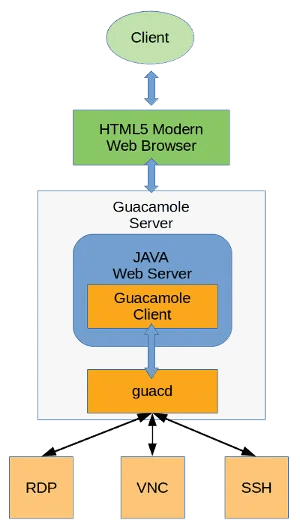
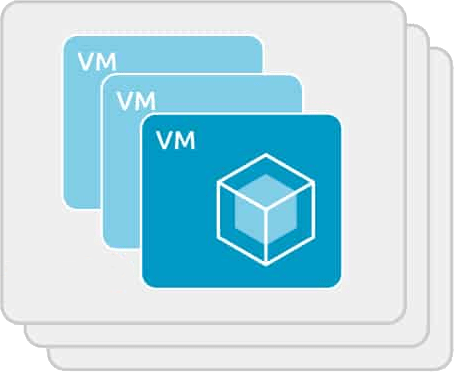
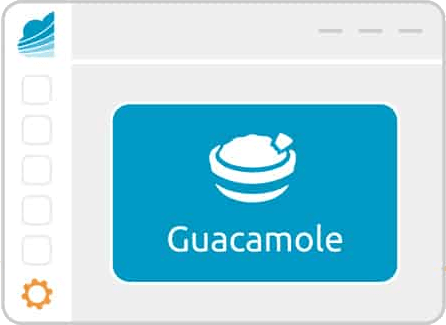
VNC/RDP/other
Web Browser
Source: https://guacamole.apache.org/doc/gug/guacamole-architecture.html

Guacamole dotool
guacamole-dotool --url wss://example.org/guacamole -- \
key Cmd+t pause 2 type 'echo "Hello, world!"' \
key Enter pause 0.5 capture screenshot.pngimport { Client, setDomGlobals } from 'guacamole-dotool'
setDomGlobals()
const c = await Client.connect('wss://example.org/guacamole')
await c.keysPress('Cmd', 't')
await c.pause(2)
await c.type('echo "Hello, world!"')
await c.keysPress('Enter')
await c.pause(0.5)
await c.captureScreenToFile('screenshot.png')
c.disconnect()CLI
JS
CI Pipeline
installer-image-fetch
opencore-image-fetch
check-images
setup
customize
finalize
install
create and start VM
run guibot script
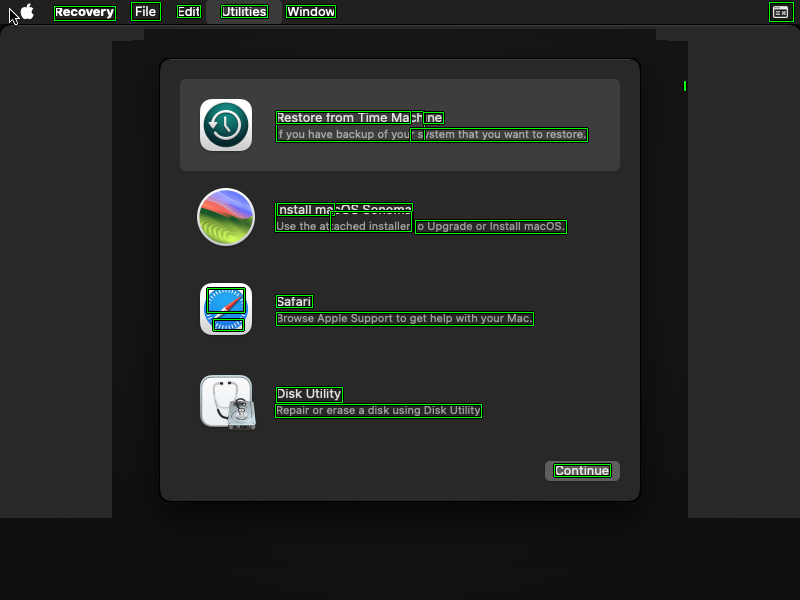
bot.wait(Text('Restore from Time Machine'), 300)Wait for the macOS Recovery image to boot
Open Terminal
18:19:14 Connecting to one.example.org
18:19:15 Waiting for the macOS Recovery image to boot
18:19:15 Waiting for Restore from Time Machine
18:20:49 Screen OCR:
╔═══════════════════════════════════════════════════════════════════════════════
‖ Utilities Window
‖
‖ Restore from Time Machine
‖ 1f you have backup of your system that you want o restore.
‖
‖ Install macOS Sonoma
‖ Use the attached installer to Upgrade or Install macOS.
‖
‖ Safari
‖ Browse Apple Support to get help with your Mac.
‖
‖ Utity
‖
‖ Repair or erase a disk using Disk Utiity.
‖
‖ Continue
╚═══════════════════════════════════════════════════════════════════════════════
18:20:49 Opening Terminal
18:20:49 Pressing together keys 'Shift'+'Super'+'t'
18:20:50 Waiting for Terminal
Open Terminal
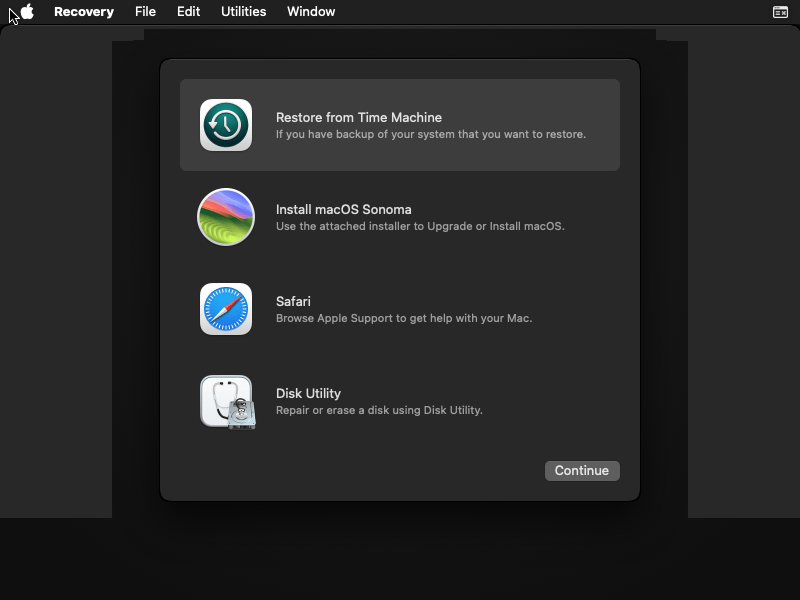
bot.press_keys([keys.SHIFT, keys.SUPER, 't'])
bot.wait(Text('Terminal'), 5)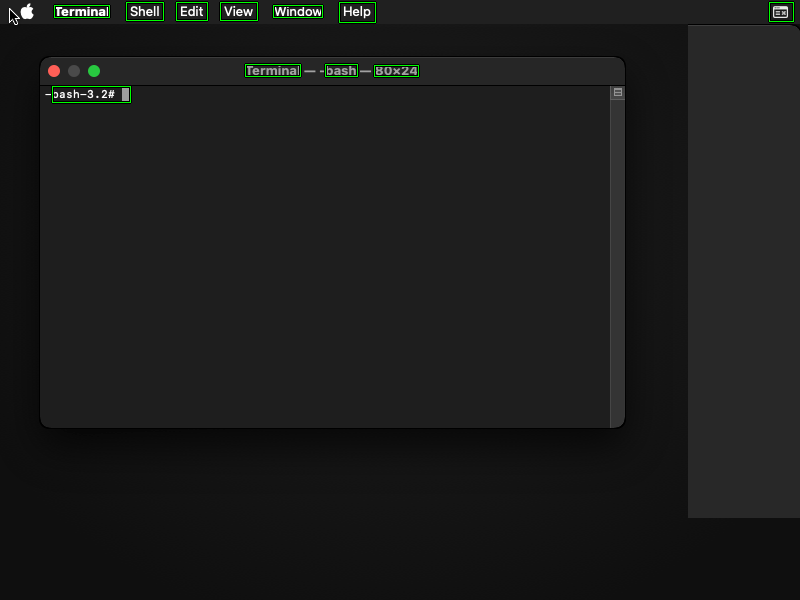
Increase font size
bot.type_text('+++++', [keys.SUPER])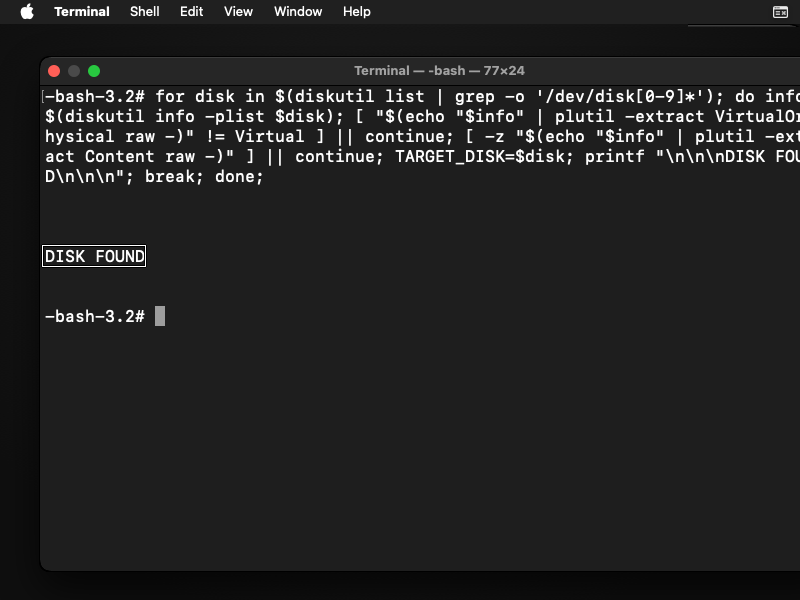
Locate the target disk
bot.type_text(FIND_DISK_SCRIPT); bot.idle(15)
bot.press_keys(keys.ENTER)
bot.wait(Text('DISK FOUND'), LONG_WAIT)for disk in $(diskutil list | grep -o '/dev/disk[0-9]*'); do
info=$(diskutil info -plist $disk)
disk_type=$(echo "$info" \
| plutil -extract VirtualOrPhysical raw -)
[ "$disk_type" != Virtual ] || continue
content=$(echo "$info" | plutil -extract Content raw -)
[ -z "$content" ] || continue
TARGET_DISK="$disk"
printf "\\n\\n\\nDISK FOUND\\n\\n\\n"
break
doneFormat the target disk
bot.type_text(FORMAT_DISK_SCRIPT); bot.idle(4)
bot.press_keys(keys.ENTER)
bot.wait(Text('DISK FORMATTED'), LONG_WAIT)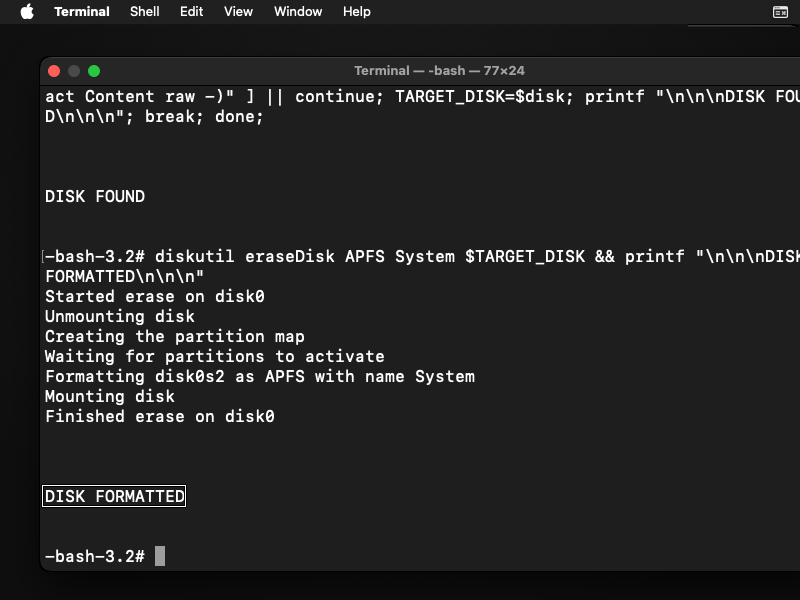
diskutil eraseDisk APFS System $TARGET_DISK \
&& printf "\\n\\n\\nDISK FORMATTED\\n\\n\\n"Start macOS installer
bot.type_text(...) bot.press_keys(keys.ENTER) bot.find_text_by_regex('Preparing:')
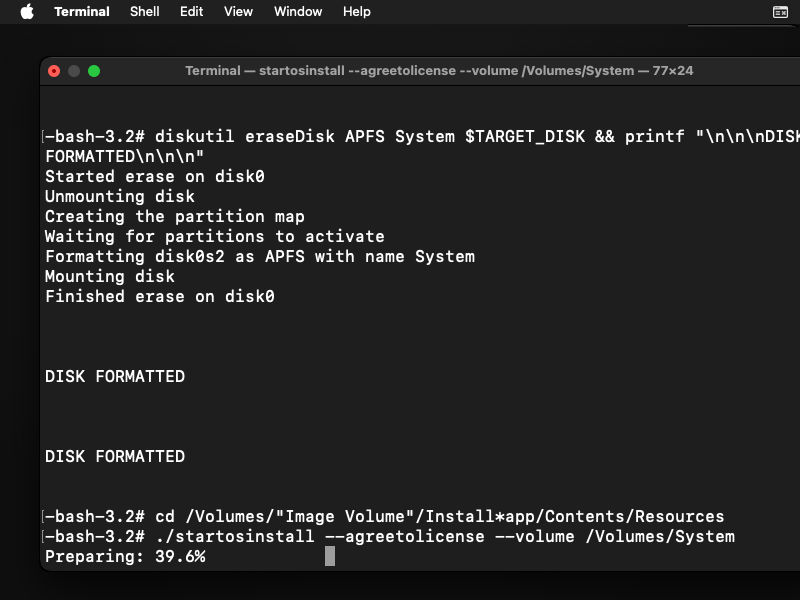
cd /Volumes/"Image Volume"/Install*app/Contents/Resources
./startosinstall --agreetolicense --volume /Volumes/SystemRebooting
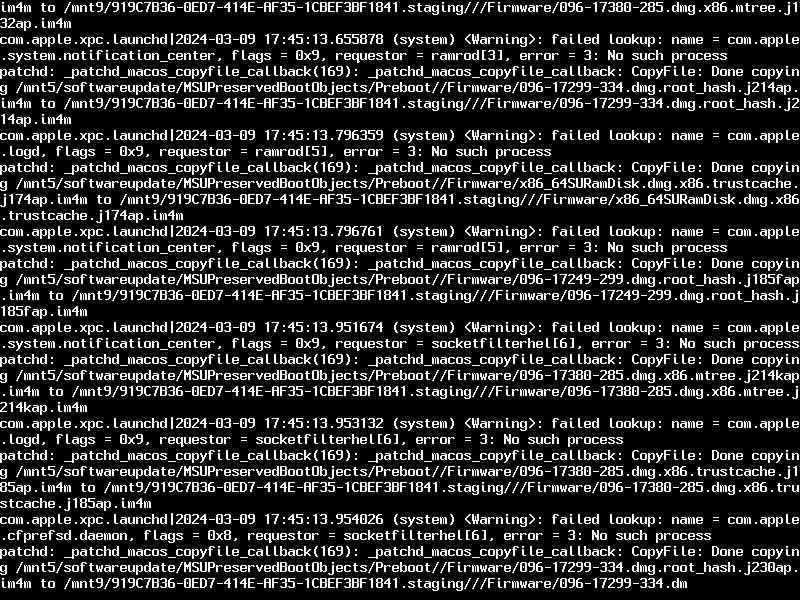
Installing…
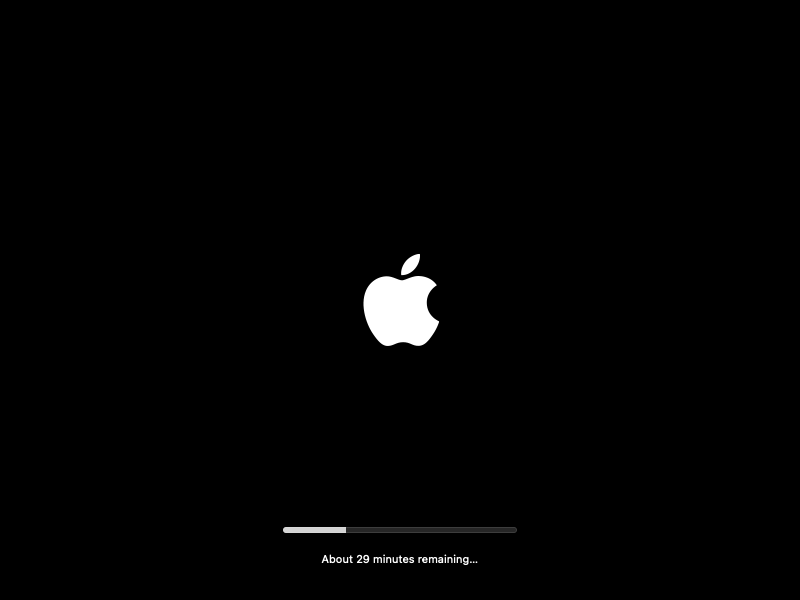
Rebooting again
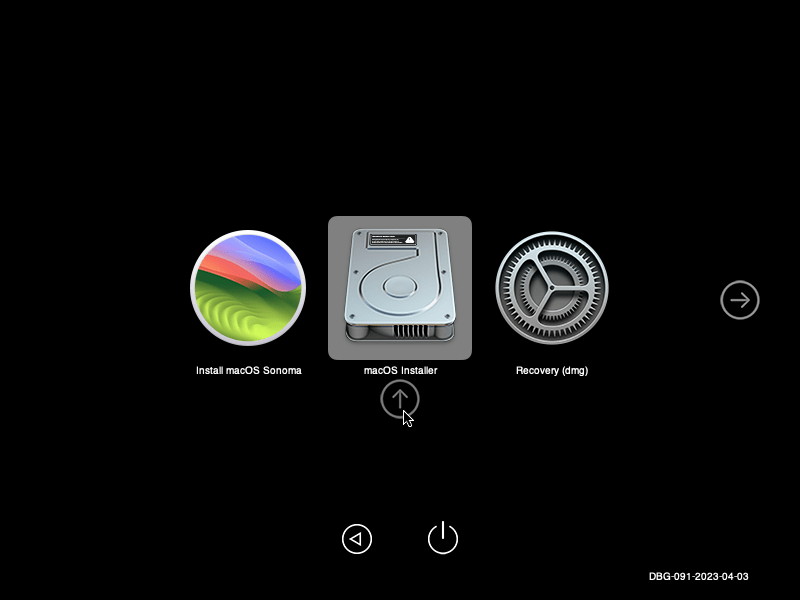
And again…


After 30 min since the start…
Source: ChatGPT 4 (DALL-E 2) trained on art stolen from the Internet
Setup Assistant
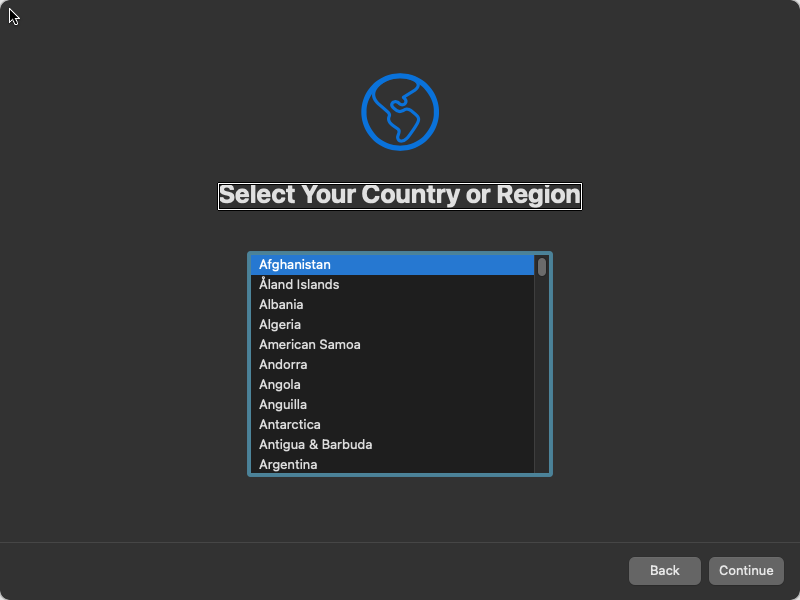
bot.wait(Text('Select Your Country or Region'), 90 * 60)CI Pipeline
installer-image-fetch
opencore-image-fetch
check-images
setup
customize
finalize
install
Select United States
bot.type_text('United States')
bot.click(Text('United States'))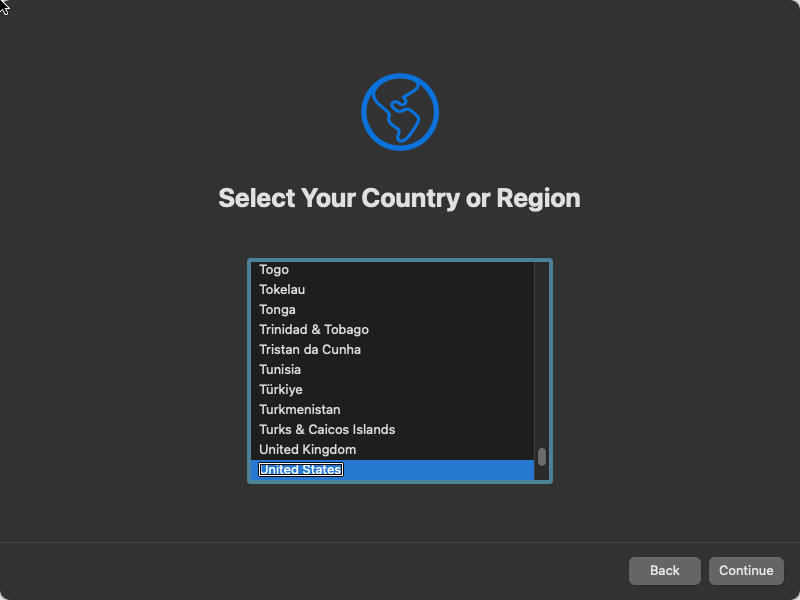
Find and click on Continue button
right_button = bot.click(Button('Continue'))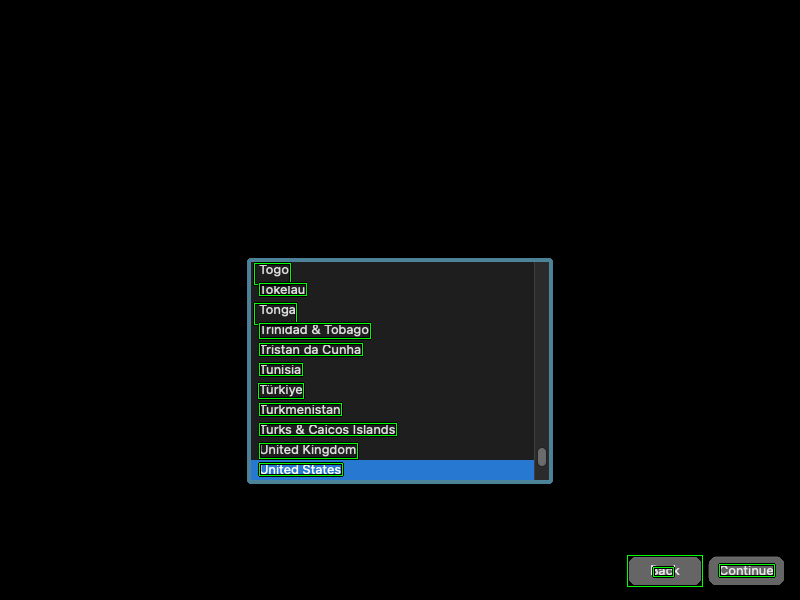
Click on Continue
bot.wait(Text('Written and Spoken Languages'), LONG_WAIT)
bot.click(right_button)
Click on Continue Not Now
bot.wait(Text('Accessibility'), LONG_WAIT)
bot.click(right_button)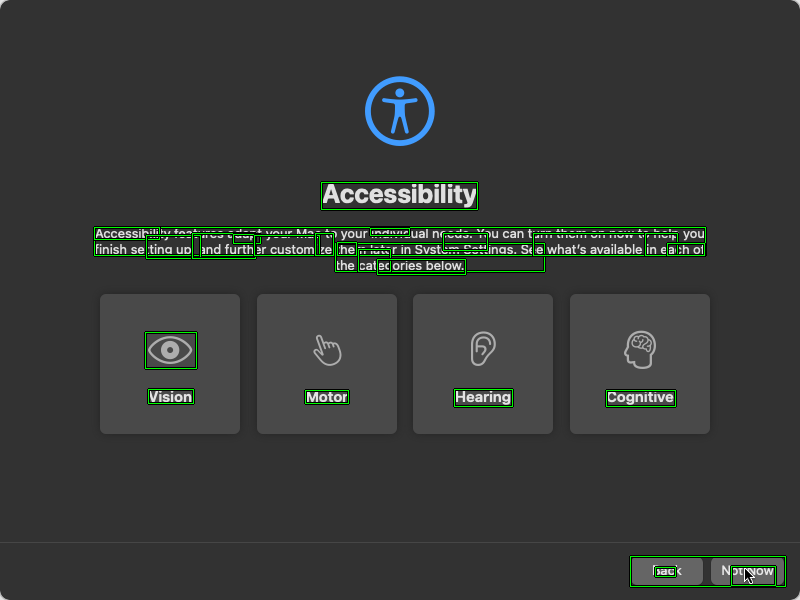
Click on Continue
bot.wait(Text('Data & Privacy'), LONG_WAIT)
bot.click(right_button) 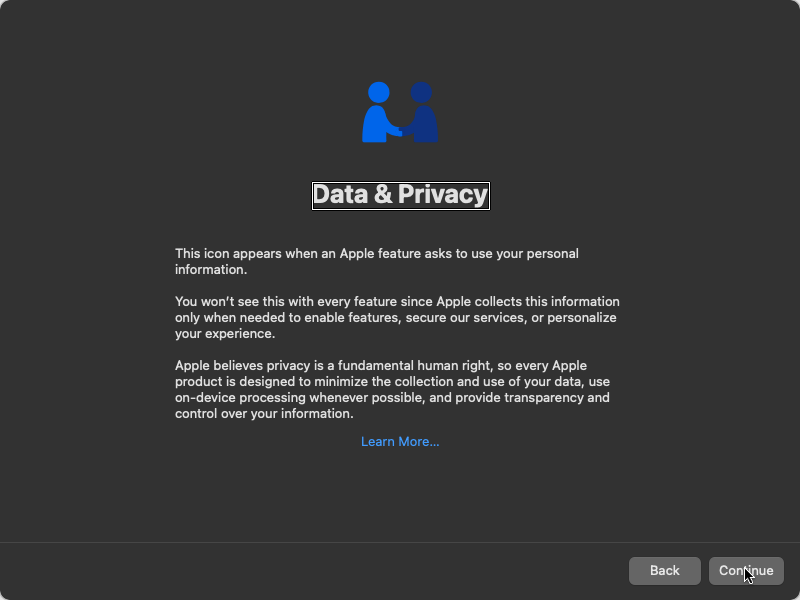
Find and click on “Not now” button link
bot.wait(Text('Migration Assistant'), LONG_WAIT)
bot.click(Text('Not now'))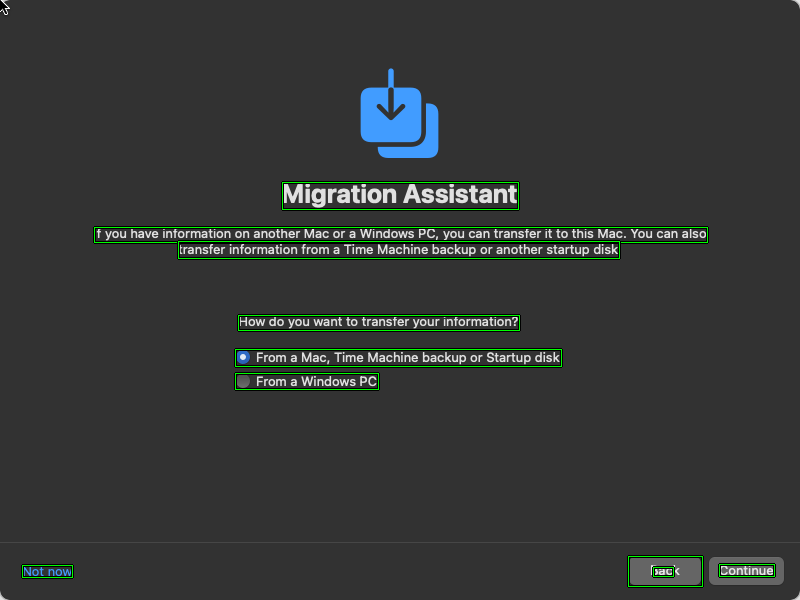
Find and click on “Set Up Later” link
bot.wait(Text('Sign In with Your Apple ID'), LONG_WAIT)
bot.click(Text('Set Up Later')) 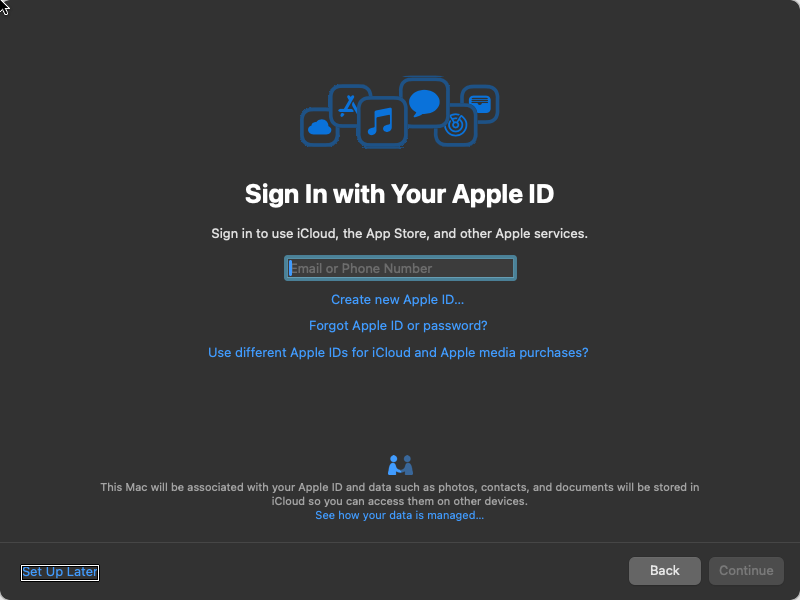
Click on Skip
if bot.exists(Text('Are you sure you want to skip'), 5):
bot.click(Button('Skip'))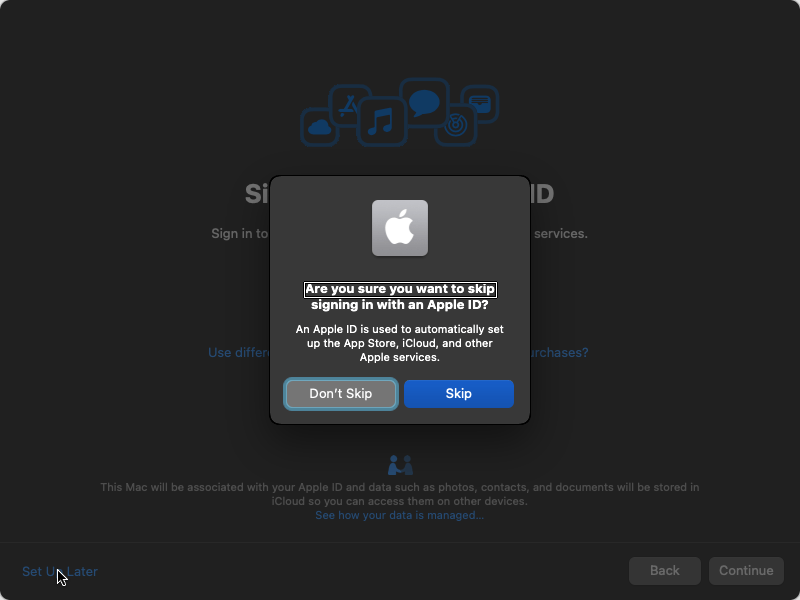
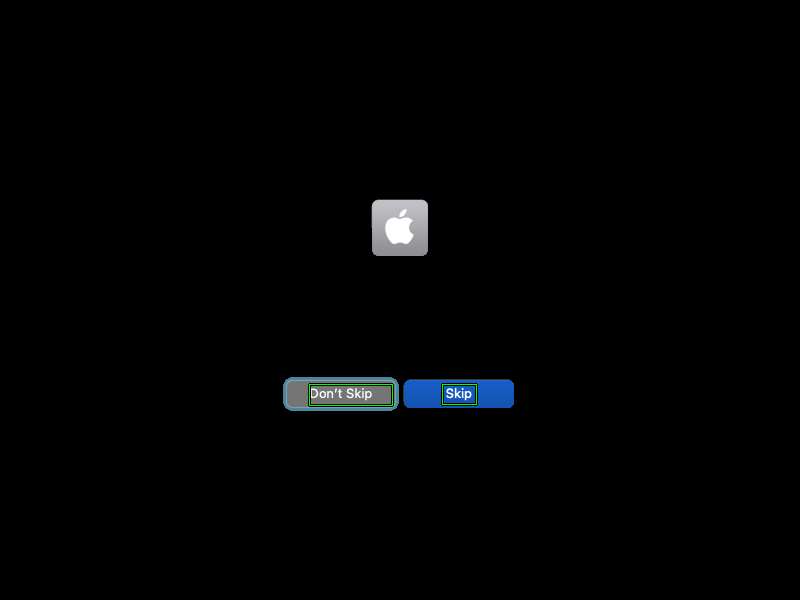
Click on Agree
bot.wait(Text('Terms and Conditions'), LONG_WAIT)
bot.click(right_button)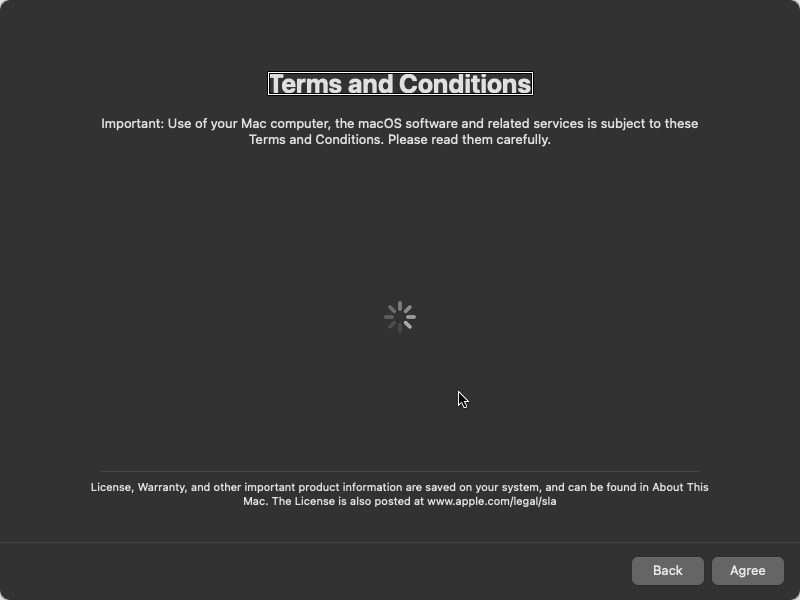
Click on Agree… again
bot.wait(Button('Disagree'), 10)
bot.click(Button('Agree'))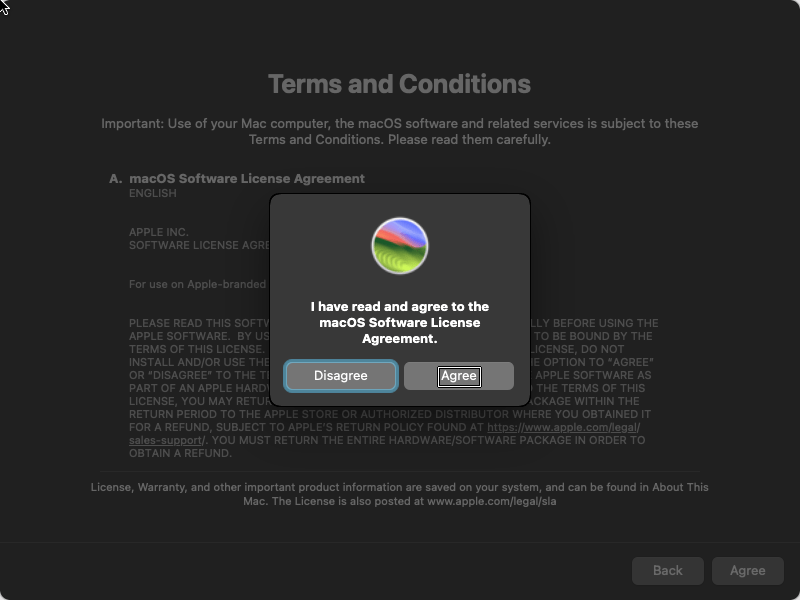

Fill out the form
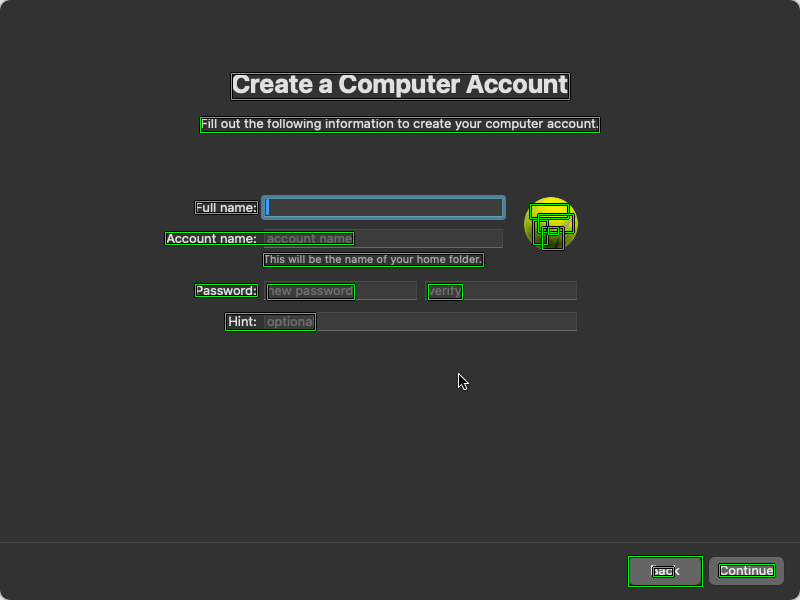
bot.wait(Text('Create a Computer Account'), LONG_WAIT)
bot.type_text('Admin') # Full name
bot.press_keys(keys.TAB)
bot.idle(0.5)
bot.type_text('admin') # Account name
bot.press_keys(keys.TAB)
bot.idle(0.5)
bot.type_text(ADMIN_PASSWORD) # Password
bot.press_keys(keys.TAB)
if bot.exists(Text('Password requirements'), 2):
raise ValueError('Too weak password')
bot.type_text(ADMIN_PASSWORD) # verify
bot.idle(1)
bot.click(right_button) # Continue
Click on Continue
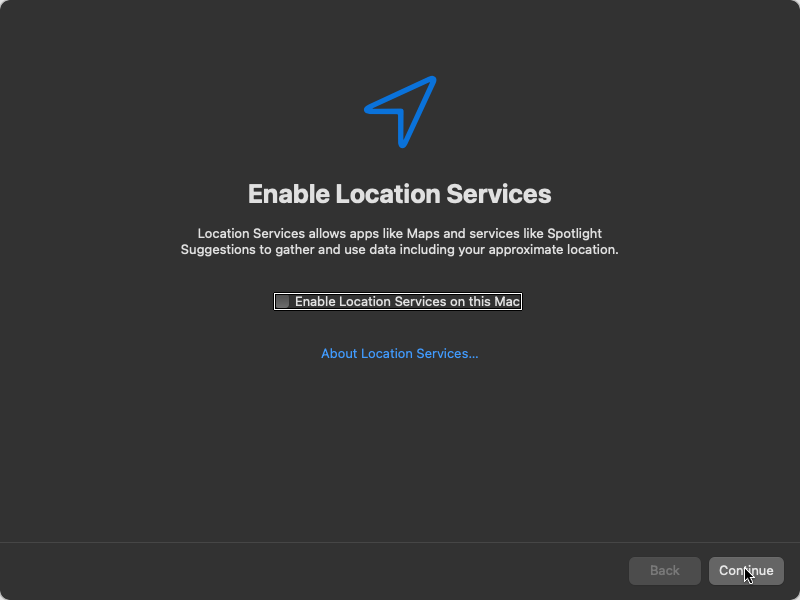
bot.wait(Text('Enable Location Services on this Mac'), LONG_WAIT * 4)
bot.click(right_button)Find and click on “Don’t Use” button
bot.click(bot.wait(Button("Don't Use"), LONG_WAIT))
Select timezone Prague
bot.wait(Text('Select Your Time Zone'), LONG_WAIT)
bot.press_keys(keys.TAB)
bot.type_text('Prague')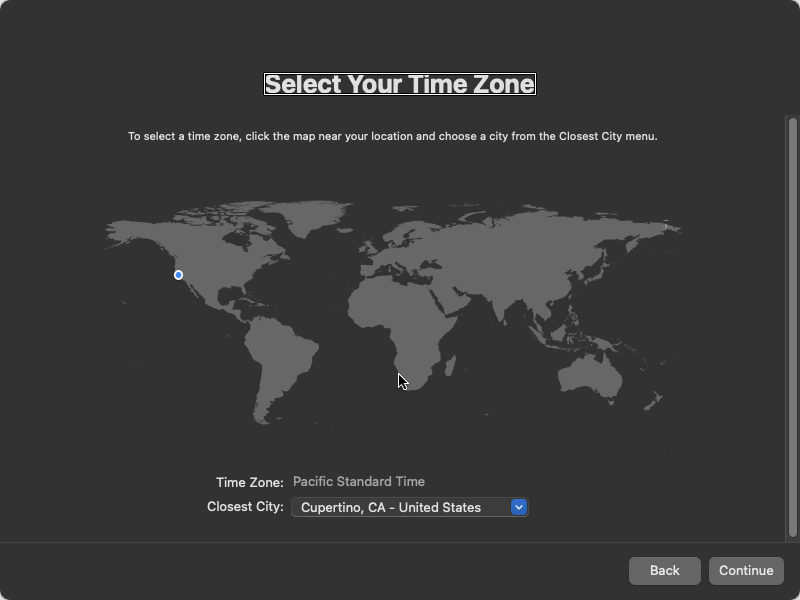
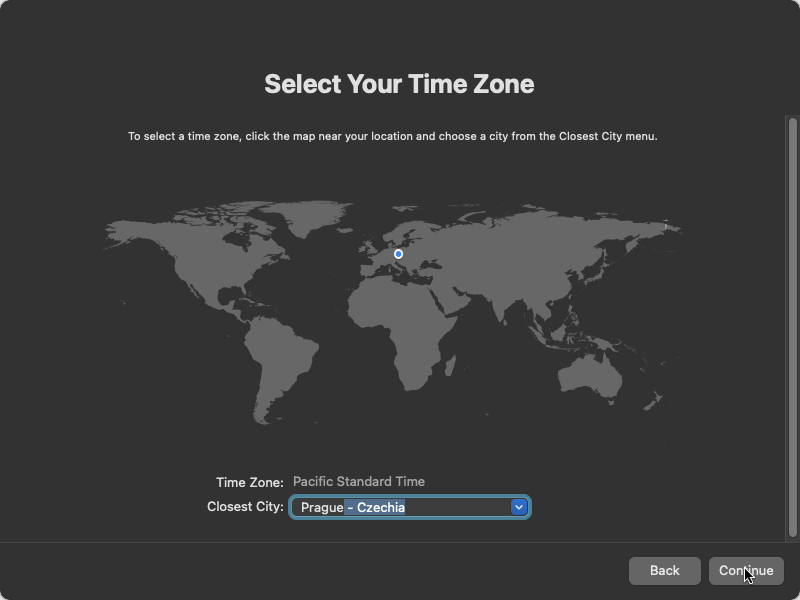
Uncheck Share Mac Analytics with Apple
bot.wait(Text('Analytics'), LONG_WAIT)
bot.click(Text('Share Mac Analytics with Apple'))
bot.idle(SHORT_WAIT)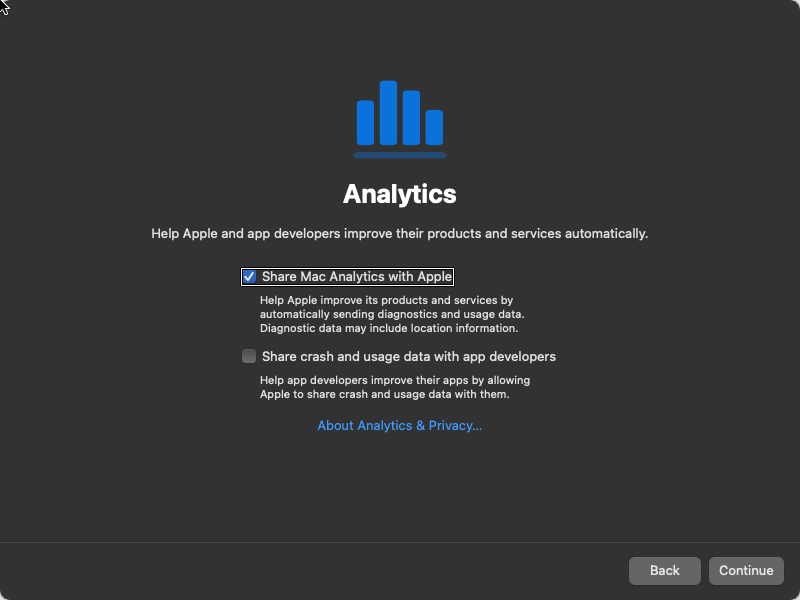
Find and click on “Set Up Later” link
bot.wait(Text('Screen Time'), LONG_WAIT)
bot.click(Text('Set Up Later'))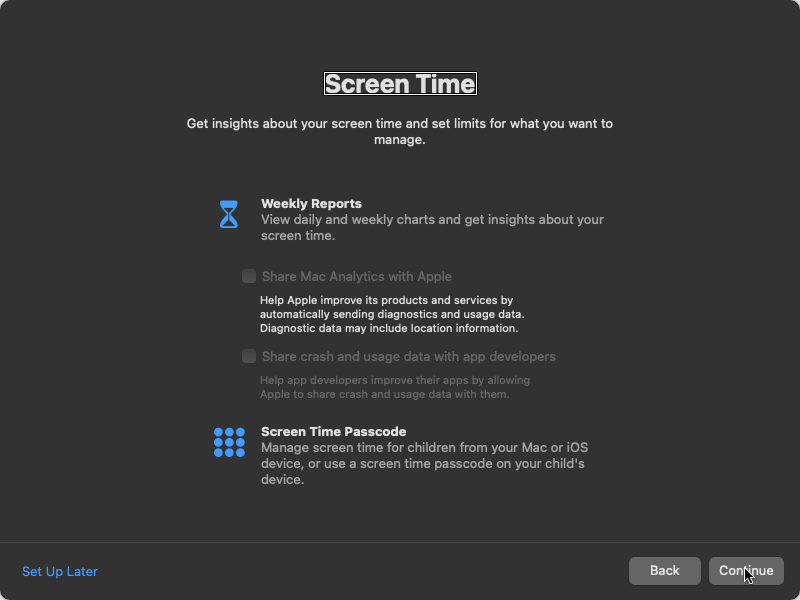
Click on Continue
bot.wait(Text('Choose Your Look'), LONG_WAIT)
bot.click(right_button)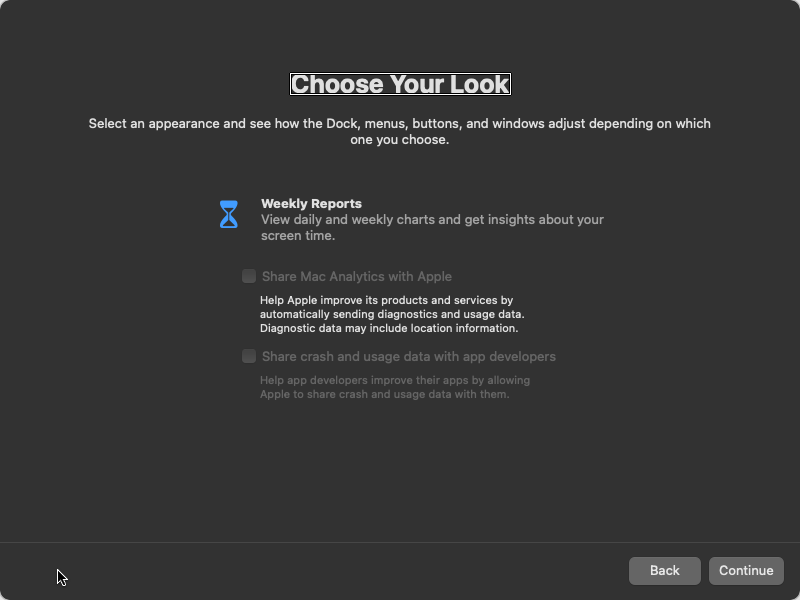
Setup Assistant completed!
log.info('Waiting for Setup Assistant to complete')
bot.wait(Text('Window'), LONG_WAIT * 3)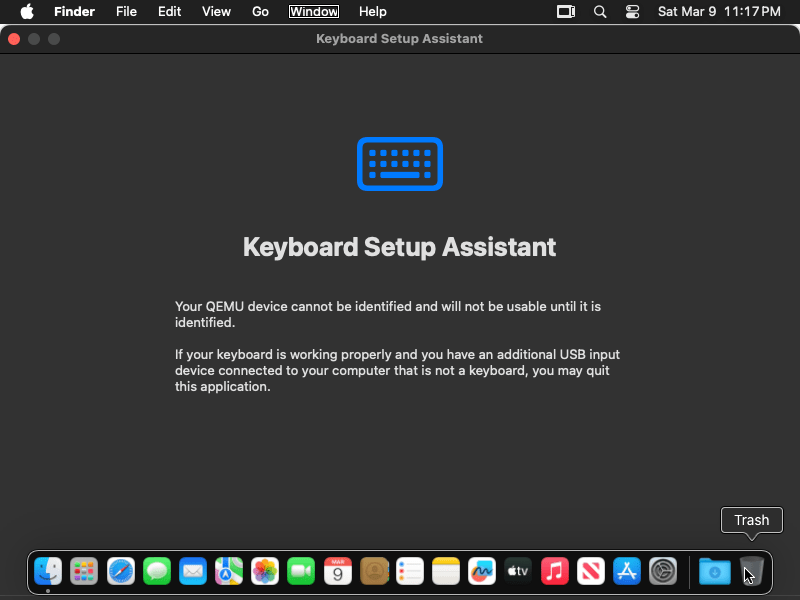
Enable Full Disk Access for Terminal.app
Needed to adjust specific system settings from Terminal (e.g. enable remote SSH access).
It’s designed so that only a user can enable it, not a script.
Tab navigation
Ctrl + F7
Switch Tab to navigation through all controls on the screen, including OK/Cancel buttons.
Open System Settings
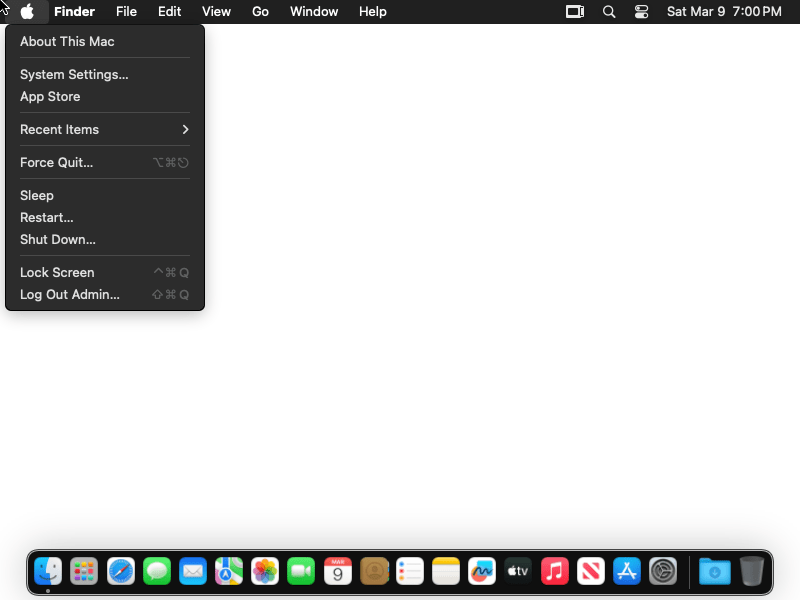
# Move focus to the menu bar.
bot.press_keys([keys.CTRL, keys.F2])
bot.idle(0.5)
bot.press_keys(' ') # open the Apple logo item
bot.idle(0.5)
if MACOS_VERSION < 14: # Ventura and older
bot.press_keys(keys.DOWN) # select About This Mac
bot.press_keys(keys.DOWN) # select System Settings…
bot.press_keys(keys.ENTER)Search for “Full Disk Access”

bot.press_keys([keys.SUPER, 'f']) # move focus to the search bar
bot.idle(1)
# XXX: Search sometimes doesn't work on Sonoma.
bot.type_text('full disk ac')
bot.wait(Text('Privacy & Security'), LONG_WAIT)
bot.idle(SHORT_WAIT)
bot.press_keys(keys.DOWN) # select Privacy & Security
bot.idle(SHORT_WAIT) # we have to wait till it's loaded in the right panel
bot.press_keys(keys.DOWN) # select Allow applications to access all user files
# Title in the main part of the System Settings window.
bot.wait(Text('Full Disk Access'), LONG_WAIT)
bot.idle(1)Click on [+]
bot.press_keys(keys.TAB)
bot.press_keys(keys.TAB) # [+]
bot.press_keys(' ')
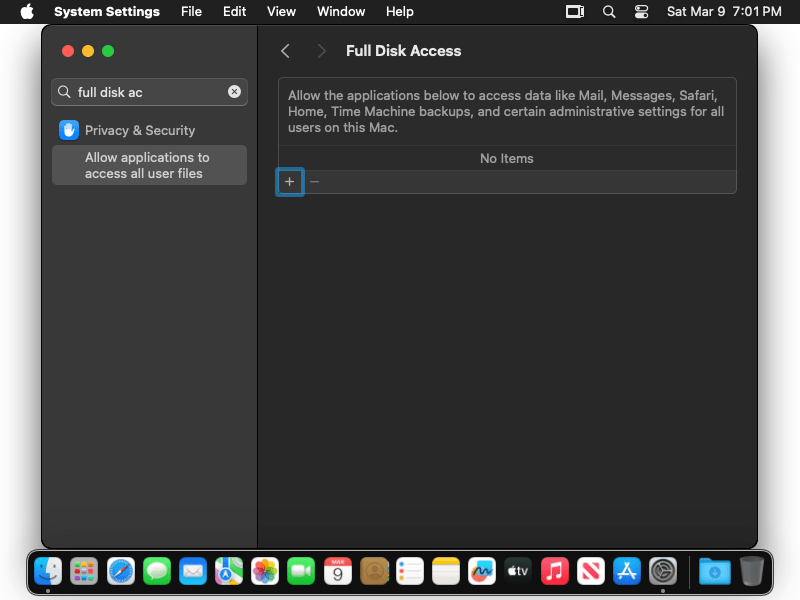
Enter admin password
bot.wait(Button('Modify Settings'), LONG_WAIT)
bot.type_text(ADMIN_PASSWORD)
bot.press_keys(keys.ENTER)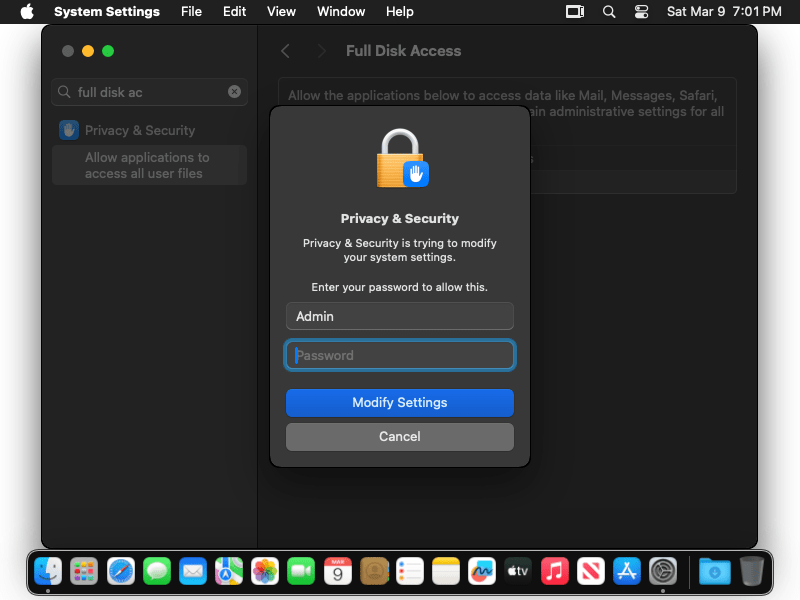

Search for Terminal
bot.wait(Text('Documents'), LONG_WAIT)
bot.press_keys('/') # invoke Go to the folder
bot.type_text('Applications/Utilities/Terminal')
bot.press_keys(keys.ENTER)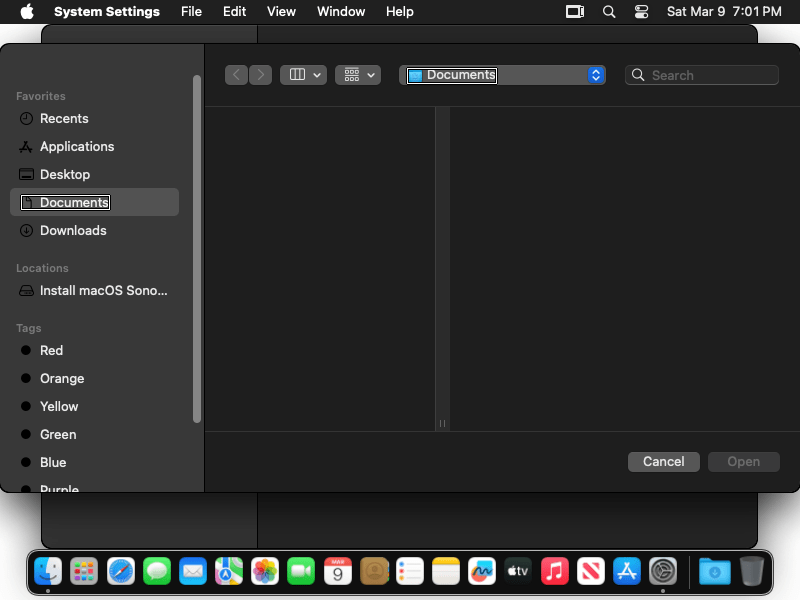
Wait for Open button and press Enter
bot.wait(Button('Open'), SHORT_WAIT * 2)
bot.press_keys(keys.ENTER)
bot.wait_vanish(Button('Open'), LONG_WAIT)
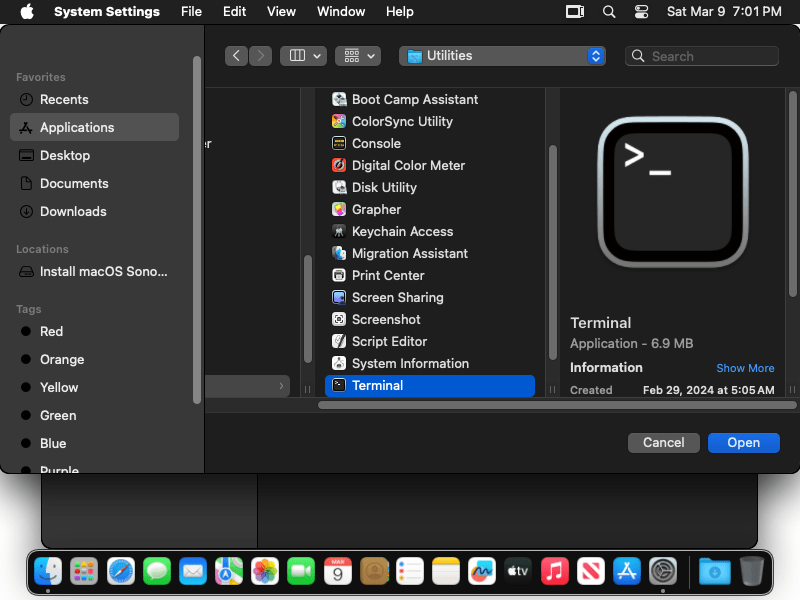
Open Terminal
bot.press_keys([keys.SUPER, ' '])
bot.press_keys(keys.BACKSPACE)
bot.type_text('Terminal')
bot.press_keys(keys.ENTER)
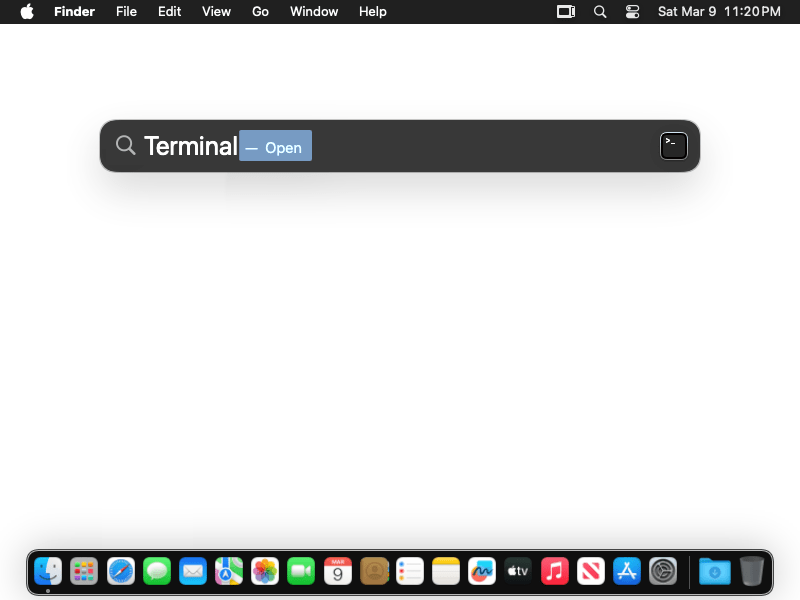
Open Terminal
bot.type_text('printf "\\n\\n\\nREADY\\n\\n\\n"')
bot.press_keys(keys.ENTER)
bot.wait(Text('READY'), LONG_WAIT)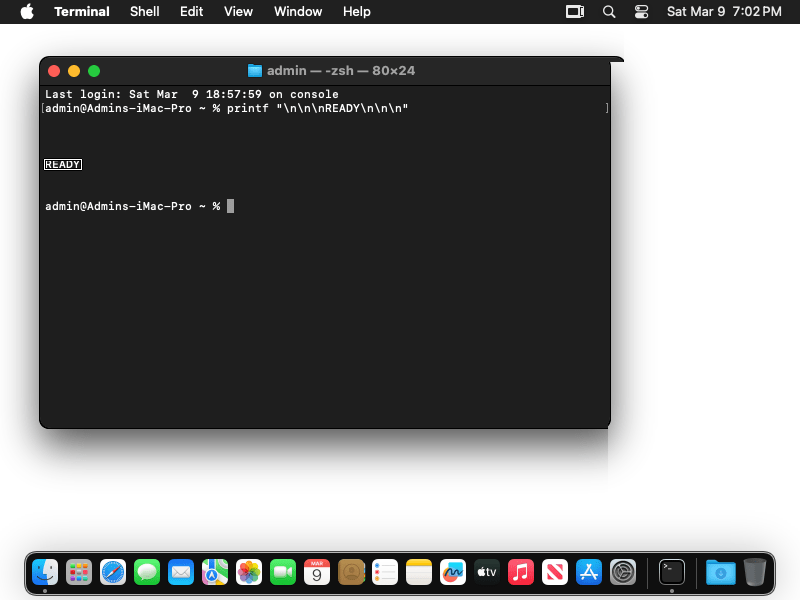
Enable sudo, SSH access and print IP
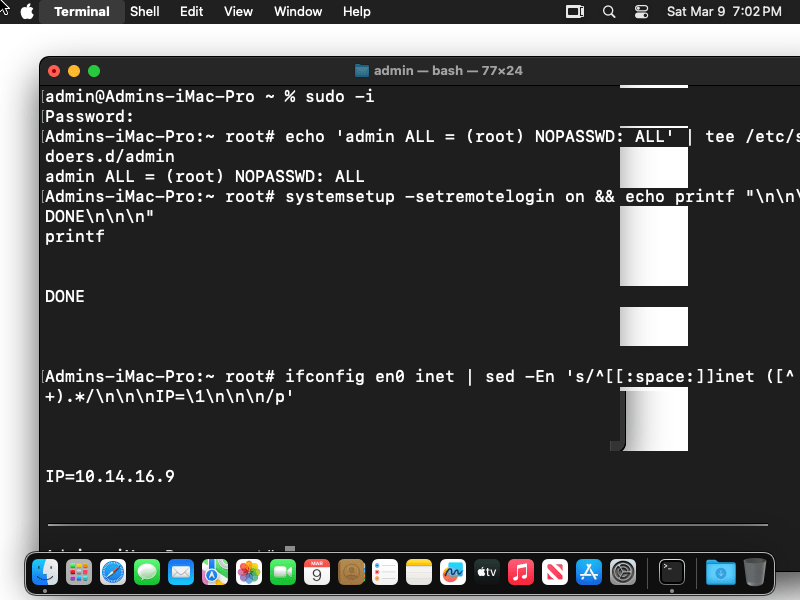
bot.type_text('sudo -i')
bot.press_keys(keys.ENTER)
bot.type_text(ADMIN_PASSWORD)
bot.press_keys(keys.ENTER)
bot.type_text("echo 'admin ALL = (root) NOPASSWD: ALL' | tee /etc/sudoers.d/admin")
bot.idle(4)
bot.press_keys(keys.ENTER)
bot.type_text('systemsetup -setremotelogin on && echo printf "\\n\\n\\nDONE\\n\\n\\n"')
bot.idle(4)
bot.press_keys(keys.ENTER)
bot.wait(Text('DONE'), LONG_WAIT)
bot.type_text('clear')
bot.press_keys(keys.ENTER)
bot.type_text("""
ifconfig en0 inet | sed -En 's/^[[:space:]]inet ([^ ]+).*/\\n\\n\\nIP=\\1\\n\\n\\n/p'
""")
bot.idle(1)
bot.press_keys(keys.ENTER)CI Pipeline
installer-image-fetch
opencore-image-fetch
check-images
setup
customise
finalise
install
Using shell script via SSH:
- Copy EFI from OpenCore to the target disk
- Disable automatic updates
- Disable sleep
- Set 24-hour format
- Enable autologin as user admin
- Install XCode
- Install Homebrew or MacPorts
- Install macos-init
- Install additional packages
- Cleanup caches
Customise
>150minutes
From 0 to customised bootable VM image with
in

Notes
- I used OpenNebula because it was requested, but I don’t recommend it.
- macOS GUI is unreliable and non-deterministic (under load).
- I considered using VoiceOver for automation, but it was no better.
- I haven’t fully explored all possible approaches due to time constraints.
- If you know about a better way, please tell me after the talk.

Q&A
Source: ChatGPT 4 (DALL-E 2) trained on art stolen from the Internet
Automated macOS installation on VMs
By Jakub J.
Automated macOS installation on VMs
How to install macOS on a Linux virtualisation infrastructure – from downloading the installer from Apple, through installation, initial setup, customisation and creating a bootable disk image. And it’s done in a way that Cupertino probably hasn’t even thought of – without the use of a mouse, fully automated with CI. For comparison, I’ll also show how easy it is to do the same thing with Alpine Linux.
- 386
